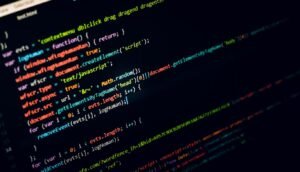Applications of Data Science
Data science is a rapidly growing field that leverages a combination of programming, statistics, and domain knowledge to extract insights and actionable information from data. From predicting customer behavior to optimizing business processes, data science has applications in various industries. In this article, we will explore the diverse range of applications of data science and how it is transforming the way businesses operate.
Key Takeaways:
- Data science uses advanced techniques to analyze and extract valuable insights from large datasets.
- Data science has applications in industries such as finance, healthcare, marketing, and transportation.
- Data science can help businesses make informed decisions, improve operational efficiency, and enhance customer experiences.
1. Forecasting and Predictive Analytics
Data science allows businesses to predict future outcomes based on historical data. **By analyzing patterns and trends**, predictive models can be developed to forecast demand, sales, and other key performance indicators. *Predictive analytics enable businesses to make proactive decisions and identify potential risks and opportunities.*
2. Image and Speech Recognition
Data science plays a crucial role in developing image and speech recognition technologies. **Using machine learning algorithms**, computers can analyze images, identify objects or faces, and even understand natural language. *These advancements have applications in autonomous vehicles, virtual assistants, and healthcare diagnostics.*
3. Personalized Marketing
Data science enables businesses to **analyze customer behavior** and preferences to create targeted marketing campaigns. *By leveraging customer data and predictive analytics*, businesses can deliver personalized experiences and offers, increasing customer satisfaction and retention.
4. Fraud Detection
Data science is highly effective in detecting fraud patterns and anomalies in large datasets. **Through sophisticated algorithms and machine learning techniques**, businesses can identify fraudulent transactions or activities, mitigating losses and protecting their customers.
5. Supply Chain Optimization
Data science can optimize supply chain management by **analyzing historical data and forecasting demand**. *By accurately predicting demand, businesses can optimize inventory levels, minimize costs, and improve operational efficiency.*
6. Healthcare Analytics
Data science has significant applications in healthcare, enabling **analysis of patient data** for improved diagnosis, treatment, and preventive care. *By analyzing electronic health records and medical images*, healthcare professionals can make better-informed decisions, leading to better patient outcomes.
7. Sentiment Analysis
Data science techniques can be applied to analyze social media posts, customer reviews, and feedback to gauge public sentiment. **Sentiment analysis** provides businesses with valuable insights on how their products or services are perceived in the market. *This information can guide marketing strategies and product development efforts.*
8. Natural Language Processing
Data science enables computers to understand and process human language. **Natural Language Processing** techniques are used for various applications, including chatbots, voice assistants, and automatic translation. *These advancements have revolutionized the way we interact with technology and facilitate communication across languages.*
Tables:
| Industry | Applications of Data Science |
|---|---|
| Finance | Risk analysis, fraud detection, algorithmic trading |
| Marketing | Targeted marketing, customer segmentation, churn prediction |
| Healthcare | Patient diagnosis, drug discovery, personalized medicine |
| Data Science Technique | Applications |
|---|---|
| Machine Learning | Predictive modeling, image recognition, recommendation systems |
| Big Data Analytics | Data processing, real-time analytics, IoT applications |
| Natural Language Processing | Chatbots, sentiment analysis, voice assistants |
| Challenges in Data Science | Solutions |
|---|---|
| Data Quality | Data cleansing, preprocessing techniques |
| Data Privacy | Use of anonymization techniques, compliance with regulations |
| Interpretability | Development of explainable models, visualization techniques |
In conclusion, the applications of data science are vast and continue to expand as new technologies and techniques are developed. From forecasting and predictive analytics to personalized marketing and fraud detection, data science has proved to be indispensable for businesses across industries. By leveraging the power of data, businesses can gain valuable insights, make informed decisions, and stay ahead in the competitive market.

Common Misconceptions
Misconception 1: Applications or Data Science is only for programmers
One common misconception about Applications or Data Science is that it is a field exclusively limited to programmers or individuals with strong coding skills. While coding is indeed an essential aspect, the field of Applications or Data Science involves various roles and skill sets.
- Data visualization skills are equally important in Applications or Data Science.
- Domain knowledge and understanding of business operations are valuable skills in this field.
- Collaboration and communication skills are essential for working effectively in a team.
Misconception 2: Applications or Data Science can predict everything accurately
Another misconception is that Applications or Data Science can predict any outcome with absolute accuracy. While data analysis techniques and algorithms can provide valuable insights and make predictions, it is crucial to understand that there are limitations.
- Data quality and reliability affect the accuracy of predictions.
- External factors and variables that are not included in the data can influence outcomes.
- Models need to be continuously updated and improved to stay relevant.
Misconception 3: Applications or Data Science is all about complex math and statistics
Some people mistakenly believe that Applications or Data Science is only about complex math and statistics. While these skills are undoubtedly important, they are just a part of the larger field.
- Understanding the business problem and framing it in the context of data analysis is critical.
- Data cleaning and preprocessing are fundamental steps before applying any statistical models.
- Effective data storytelling and visualization require creativity and design skills.
Misconception 4: Applications or Data Science is a field that replaces human decision-making
Contrary to popular belief, Applications or Data Science is not intended to replace human decision-making processes but rather to augment them. Data analysis and applications provide additional insights and assist in making informed decisions.
- Human intuition and experience are crucial for interpreting the results of data analysis.
- Applications and models should be used as tools to support decision-making, not as definitive solutions.
- Subject matter experts provide context and domain-specific insights that data alone cannot provide.
Misconception 5: Applications or Data Science is a one-size-fits-all solution
Another common misconception is that Applications or Data Science can be applied universally to any problem or industry with the same level of success. However, different industries and problems require tailored approaches and specific domain knowledge.
- Understanding the unique characteristics and requirements of the industry is crucial.
- Customizing algorithms and models to the specific problem at hand leads to more accurate results.
- Successful Applications or Data Science projects require close collaboration between data scientists and industry experts.

Applications of Data Science
Data science is a rapidly growing field that has transformed the way businesses operate and make decisions. By leveraging the power of data, organizations are able to gain valuable insights, make predictions, and drive innovation. In this article, we explore 10 fascinating applications of data science across various industries, showcasing how data-driven approaches have revolutionized these sectors.
Enhancing Customer Experience in E-commerce
With the explosion of e-commerce, companies are utilizing data science techniques to better understand their customers and provide personalized experiences. By analyzing purchase history, browsing behavior, and demographic information, online retailers can recommend products, personalize marketing campaigns, and improve overall customer satisfaction.
| Customer ID | Age | Purchase History | Recommended Product |
|---|---|---|---|
| 123 | 28 | Smartphone, TV, Headphones | Smartwatch |
| 456 | 35 | Laptop, Video Games | Gaming Chair |
| 789 | 42 | Camera, Lens | Photography Bag |
Predictive Maintenance in Manufacturing
Manufacturing companies are leveraging data science to implement predictive maintenance strategies. By analyzing real-time sensor data from machines, algorithms can detect anomalies and predict potential failures, allowing organizations to schedule maintenance activities proactively and prevent costly production downtime.
| Machine ID | Sensor Data | Probability of Failure |
|---|---|---|
| 001 | Temperature: 70°C, Vibration: 0.5 | 5% |
| 002 | Temperature: 80°C, Vibration: 1.2 | 87% |
| 003 | Temperature: 65°C, Vibration: 0.3 | 2% |
Optimizing Supply Chain Logistics
Data science is revolutionizing supply chain management by optimizing logistics and reducing costs. Through advanced algorithms, companies can analyze historical data, weather patterns, and transportation routes to determine the most efficient delivery routes, minimize distribution times, and better manage inventory levels.
| Product | Origin | Destination | Optimized Route |
|---|---|---|---|
| Laptops | China | USA | Sea Route via Pacific Ocean |
| Clothing | India | Germany | Air Route via Frankfurt |
| Automobile Parts | Japan | Brazil | Land Route via Argentina |
Improving Healthcare Outcomes with Predictive Analytics
Data science is transforming the healthcare industry by enabling predictive analytics. By analyzing patient data and medical records, algorithms can predict disease outcomes, identify high-risk patients, and recommend personalized treatment plans, improving patient care and increasing survival rates.
| Patient ID | Age | Medical History | Predicted Disease Progression |
|---|---|---|---|
| 001 | 45 | Diabetes, High Blood Pressure | Increased Risk of Cardiovascular Disease |
| 002 | 65 | Smoking, Lung Disease | Higher Chance of Lung Cancer |
| 003 | 32 | Obesity, Sedentary Lifestyle | Risk of Developing Diabetes |
Personalized Recommendations in Entertainment
Streaming platforms leverage data science to provide personalized content recommendations to viewers. By analyzing viewing history, ratings, and user preferences, algorithms can suggest movies and TV shows tailored to individual tastes, enhancing the overall streaming experience and driving user engagement.
| User ID | Viewing History | Recommended Content |
|---|---|---|
| 123456 | The Office, Friends, Stranger Things | Parks and Recreation |
| 987654 | Breaking Bad, Game of Thrones | Peaky Blinders |
| 543210 | How I Met Your Mother, The Big Bang Theory | Brooklyn Nine-Nine |
Fraud Detection in Financial Systems
Data science plays a crucial role in detecting and preventing fraudulent activities within financial systems. By analyzing transactional data, user behavior, and patterns, algorithms can flag suspicious transactions, identify potential fraud, and mitigate financial risks, safeguarding the integrity of financial institutions.
| Transaction ID | User ID | Amount | Fraud Probability |
|---|---|---|---|
| 1234 | 5678 | $1,000 | 87% |
| 5678 | 9101 | $5,000 | 2% |
| 9101 | 1234 | $3,500 | 95% |
Smart Traffic Management Systems
Data science is transforming urban transportation by optimizing traffic flow and reducing congestion. By analyzing real-time traffic data, weather conditions, and historical patterns, algorithms can dynamically adjust traffic signal timings, suggest alternate routes, and improve overall transportation efficiency.
| Intersection | Traffic Flow | Optimized Signal Timings |
|---|---|---|
| A | High Traffic | Longer Green Time |
| B | Medium Traffic | Equal Distribution |
| C | Low Traffic | Shorter Green Time |
Sentiment Analysis in Social Media
Data science techniques allow businesses to gain insights from social media platforms by analyzing user sentiment. By examining text data, comments, and reviews, algorithms can determine public opinion, identify trends, and help organizations make data-driven decisions regarding their products and marketing strategies.
| User | Tweet | Sentiment |
|---|---|---|
| @User1 | “I love this product! It’s amazing!” | Positive |
| @User2 | “This service is terrible, worst experience!” | Negative |
| @User3 | “I’m on the fence about this, could be better” | Neutral |
Predicting Weather Patterns
Data science enables accurate weather predictions by analyzing historical weather data, satellite imagery, and atmospheric conditions. By employing machine learning algorithms, meteorologists can forecast temperature, precipitation, and severe weather events, helping communities prepare for and mitigate the impact of extreme weather conditions.
| Location | Date | Temperature | Precipitation |
|---|---|---|---|
| New York | 2021-01-01 | 10°C | 20% chance of Rain |
| London | 2021-01-01 | 5°C | 30% chance of Snow |
| Tokyo | 2021-01-01 | 15°C | Sunny |
Conclusion
Data science has revolutionized various industries, empowering organizations to make data-driven decisions, gain insights, and drive innovation. From enhancing customer experiences to improving healthcare outcomes and optimizing supply chain logistics, the applications of data science are far-reaching. By harnessing the power of data, businesses can unleash their potential and stay ahead in today’s competitive landscape.
Frequently Asked Questions
What is Data Science?
Data Science is an interdisciplinary field that uses scientific methods, processes, algorithms, and systems to extract knowledge and insights from structured and unstructured data. It involves techniques such as data mining, machine learning, statistical analysis, and predictive modeling to solve complex problems and make informed decisions.
How is Data Science different from Data Analytics?
While both Data Science and Data Analytics involve handling and analyzing data, they have distinct differences. Data Science focuses on extracting insights, building predictive models, and uncovering patterns from large and complex datasets. On the other hand, Data Analytics primarily deals with the exploration, interpretation, and visualization of data to discover meaningful trends and patterns.
What are the real-world applications of Data Science?
Data Science has a wide range of applications in various industries. Some common areas where Data Science is applied include finance, healthcare, e-commerce, marketing, social media analysis, fraud detection, recommendation systems, and image and speech recognition.
What skills are required to become a Data Scientist?
To excel in a career in Data Science, one should have a solid foundation in mathematics and statistics. Additionally, proficiency in programming languages such as Python or R, strong analytical and problem-solving skills, domain knowledge, and familiarity with tools like SQL and machine learning libraries are crucial for success.
Can Data Science be used for predictive analysis?
Yes, predictive analysis is one of the key applications of Data Science. By leveraging historical data, machine learning algorithms, and statistical models, Data Scientists can predict future outcomes, trends, and behaviors. This allows businesses to make data-driven decisions and develop targeted strategies.
What are the challenges faced in Data Science projects?
Data Science projects often face challenges such as data quality issues, data privacy and security concerns, scalability problems, limited availability of domain expertise, and the need for continuous learning and updating skills in a rapidly evolving field.
How does Data Science benefit businesses?
Data Science can provide numerous benefits to businesses. It enables organizations to gain valuable insights from data, make data-driven decisions, improve operational efficiency, enhance customer experience, optimize marketing campaigns, reduce costs, detect fraud, and drive innovation.
Is it necessary to have a background in computer science to pursue a career in Data Science?
While a background in computer science can be helpful, it is not always necessary to have a degree in the field. Many successful data scientists come from diverse academic backgrounds such as mathematics, statistics, physics, economics, and engineering. However, having a solid understanding of programming and computer science fundamentals is still highly beneficial.
What steps are involved in the Data Science process?
The Data Science process typically involves several steps, including data collection, data cleaning and preprocessing, exploratory data analysis, feature engineering, model selection and training, model evaluation, and deployment of the final solution. Each step requires careful consideration and iteration to ensure accurate and meaningful results.
Are there any ethical considerations in Data Science?
Yes, ethics play a vital role in Data Science. Data Scientists must adhere to ethical guidelines and ensure the responsible use of data. This includes protecting user privacy, maintaining data security, avoiding bias and discrimination, and transparently communicating the limitations and potential implications of their findings.





